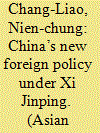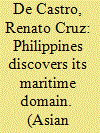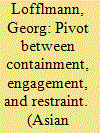|
|
|
Sort Order |
|
|
|
Items / Page
|
|
|
|
|
|
|
| Srl | Item |
| 1 |
ID:
147055


|
|
|
|
|
| Summary/Abstract |
Since taking power, the new Chinese President Xi Jinping has talked of “striving for achievements,” signaling a new theme in Chinese diplomacy. This article first examines the changes in Beijing’s foreign policy structure before moving on to examine the three major schools of thought on China’s immediate relations with its neighbors, implying that the policy focus will lie with the “advance westward” school. Moreover, this article highlights how China is maximizing its influence through economic interaction, whilst noting that economics is also being used to punish hostile countries. Furthermore, it notes that China’s next step is to influence change using the multilateral frameworks of the international system, remolding global rules to China’s benefit. The article concludes by examining Beijing’s leadership role, particularly its commitment to non-alliance, and whether Beijing and Washington can rebuild a more suitable model to reflect both country’s ambitions on the world stage.
|
|
|
|
|
|
|
|
|
|
|
|
|
|
|
|
| 2 |
ID:
147057


|
|
|
|
|
| Summary/Abstract |
With China’s naval expansion in the South China Sea, the Philippine government has eased up its counter-insurgency/counter-terrorism campaign and has vigorously pursued instead the modernization of the Armed Forces of the Philippines (AFP) particularly in developing the deterrence capability of the Philippine Navy (PN). However, slow-paced and hampered by scant resources, the naval build-up will hardly deter China’s encroachment on the Philippine maritime territory. Faced with this predicament, the Philippines has resorted to forging new security partnerships with the United States and Japan, two major naval powers in East Asia. The paper concludes that maritime security will remain the Philippines’ priority concern way into the third decade of the 21st century.
|
|
|
|
|
|
|
|
|
|
|
|
|
|
|
|
| 3 |
ID:
147056


|
|
|
|
|
| Summary/Abstract |
This article examines the formulation and implementation of American grand strategy under the Obama administration, and how the “pivot to Asia” functions within this strategic context. It argues that President Obama attempts to secure continued American hegemony through a combination of cooperative engagement and restraint. This exposes a fundamental dilemma at the heart of America’s rebalancing: increased engagement with US allies and partners in the Asia-Pacific is fueling political, economic, and military competition with China. Sequestration and questions over American strategic coherence and consistency are simultaneously undermining the credibility of the pivot, both at home and abroad. The article concludes that this dilemma makes it unlikely for the pivot to succeed in its stated aims, unless the United States re-emphasizes cooperative engagement with China.
|
|
|
|
|
|
|
|
|
|
|
|
|
|
|
|
| 4 |
ID:
147054


|
|
|
|
|
| Summary/Abstract |
Scholars and officials persistently criticize China for low transparency in its military affairs. Why does Beijing exacerbate the asymmetric information problem, even though this theoretically increases the likelihood of conflict? I offer an explanation, the vulnerability hypothesis, for why rising powers are likely to reject military transparency and the conditions under which this may change. By evaluating over 100 authoritative Chinese sources, I identify four threads of Chinese strategic thinking consistent with the vulnerability hypothesis: the United States is inherently dangerous as a declining hegemon, transparency heightens the risk of war during power transitions, transparency grants operational advantages to the opponent, and only the strong can leverage transparency to enhance deterrence. These findings have implications for power transition theory and US–China military relations.
|
|
|
|
|
|
|
|
|
|
|
|
|
|
|
|
|
|
|
|
|